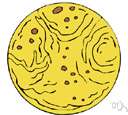Venus
Also found in: Thesaurus, Medical, Legal, Acronyms, Idioms, Encyclopedia, Wikipedia.
Ve·nus
(vē′nəs)n.
1. Roman Mythology The goddess of love and beauty.
2. The second planet from the sun, having an average radius of 6,052 kilometers (3,761 miles), a mass 0.82 times that of Earth, and a sidereal period of revolution about the sun of 224.7 days at a mean distance of approximately 108.2 million kilometers (67.2 million miles).
[Middle English, from Old English, from Latin, love, Venus; see wen- in Indo-European roots.]
American Heritage® Dictionary of the English Language, Fifth Edition. Copyright © 2016 by Houghton Mifflin Harcourt Publishing Company. Published by Houghton Mifflin Harcourt Publishing Company. All rights reserved.
Venus
(ˈviːnəs)n
1. (Classical Myth & Legend) the Roman goddess of love. Greek counterpart: Aphrodite
2. (Anatomy) mount of Venus See mons veneris
Venus
(ˈviːnəs)n
1. (Celestial Objects) one of the inferior planets and the second nearest to the sun, visible as a bright morning or evening star. Its surface is extremely hot (over 400°C) and is completely shrouded by dense cloud. The atmosphere is principally carbon dioxide. Mean distance from sun: 108 million km; period of revolution around sun: 225 days; period of axial rotation: 244.3 days (retrograde motion); diameter and mass: 96.5 and 81.5 per cent that of earth respectively
2. (Alchemy) the alchemical name for copper1
Collins English Dictionary – Complete and Unabridged, 12th Edition 2014 © HarperCollins Publishers 1991, 1994, 1998, 2000, 2003, 2006, 2007, 2009, 2011, 2014
Ve•nus
(ˈvi nəs)n., pl. -us•es.
1. an ancient Italian goddess, identified by the Romans with Aphrodite as the goddess of love and beauty.
2. an exceptionally beautiful woman.
3. the most brilliant planet, second in order from the sun, having an equatorial diameter of 7521 miles (12,104 km), a mean distance from the sun of 67.2 million miles (108.2 million km), a period of revolution of 224.68 days, and no moons.
4. Also called Ve′nus fig`ure. (sometimes l.c.) a statuette of a female figure, usu. carved of ivory and typically having exaggerated breasts, belly, or buttocks, often found in Upper Paleolithic cultures from Siberia to France.
[< Latin Venus, s. Vener- orig. a neuter common n. meaning “physical desire,” hence “qualities exciting desire, charm,” “a goddess personifying sexual attractiveness”; c. Skt vanaḥ desire, akin to wish; compare venerate, venom]
Random House Kernerman Webster's College Dictionary, © 2010 K Dictionaries Ltd. Copyright 2005, 1997, 1991 by Random House, Inc. All rights reserved.
Ve·nus
(vē′nəs) The second planet from the sun and the fourth smallest, with a diameter about 400 miles less than that of Earth. Venus comes nearer to Earth than any other planet and is the brightest object in the night sky aside from Earth's moon. It is the hottest planet in the solar system, with an average surface temperature of 867°F (464°C). See Table at solar system. See Note at planet.
The American Heritage® Student Science Dictionary, Second Edition. Copyright © 2014 by Houghton Mifflin Harcourt Publishing Company. Published by Houghton Mifflin Harcourt Publishing Company. All rights reserved.
ThesaurusAntonymsRelated WordsSynonymsLegend:
Switch to new thesaurus
| Noun | 1. |  Venus - the second nearest planet to the sun; it is peculiar in that its rotation is slow and retrograde (in the opposite sense of the Earth and all other planets except Uranus); it is visible from Earth as an early `morning star' or an `evening star'; "before it was known that they were the same object the evening star was called Venus and the morning star was called Lucifer" Venus - the second nearest planet to the sun; it is peculiar in that its rotation is slow and retrograde (in the opposite sense of the Earth and all other planets except Uranus); it is visible from Earth as an early `morning star' or an `evening star'; "before it was known that they were the same object the evening star was called Venus and the morning star was called Lucifer"solar system - the sun with the celestial bodies that revolve around it in its gravitational field |
| 2. |  Venus - goddess of love; counterpart of Greek Aphrodite Venus - goddess of love; counterpart of Greek Aphrodite | |
| 3. | Venus - type genus of the family Veneridae: genus of edible clams with thick oval shells mollusk genus - a genus of mollusks family Veneridae, Veneridae - hard-shell clams Mercenaria mercenaria, hard clam, Venus mercenaria, hard-shell clam, quahaug, quahog, round clam - an edible American clam; the heavy shells were used as money by some American Indians |
Based on WordNet 3.0, Farlex clipart collection. © 2003-2012 Princeton University, Farlex Inc.
Translations
Венера
Venuše
Venus
VeenusVenus
Venus
Venera
Vénusz
Venus
Venus
Venera
Wenus
Venus
Venera
Венера
Venus
Венера
Sao Kim
Collins Spanish Dictionary - Complete and Unabridged 8th Edition 2005 © William Collins Sons & Co. Ltd. 1971, 1988 © HarperCollins Publishers 1992, 1993, 1996, 1997, 2000, 2003, 2005
Collins English/French Electronic Resource. © HarperCollins Publishers 2005
Venus
n → Venus f
Collins German Dictionary – Complete and Unabridged 7th Edition 2005. © William Collins Sons & Co. Ltd. 1980 © HarperCollins Publishers 1991, 1997, 1999, 2004, 2005, 2007
Collins Italian Dictionary 1st Edition © HarperCollins Publishers 1995
